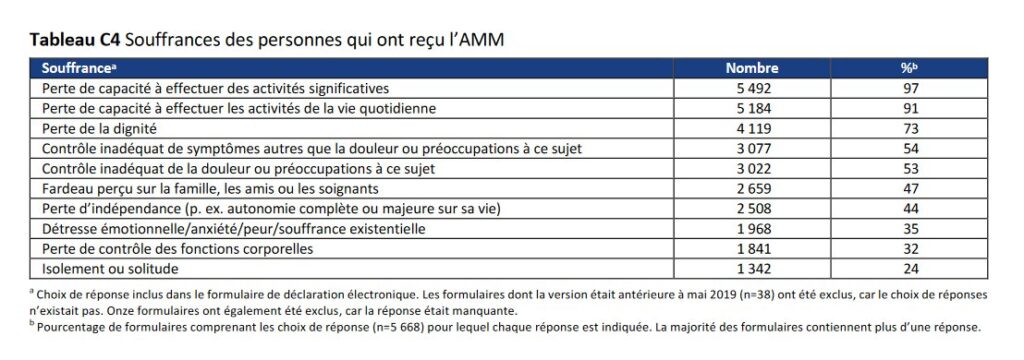Urgent need for a better understanding of "access to and quality of palliative care" in Quebec
The Commission on End-of-Life Care published Thursday a report on its activities from 1 April 2023 to 31 March 2024. The full report (50 pages) and highlights (2 pages) are available in French.
After a first reading of the report, that was diligently prepared by the Commission, the Living with Dignity citizen network offers the following observations:
– 5,717 people received medical aid in dying (MAiD) during the period studied by the report (7.3% of deaths in Quebec). This represents an increase of 9% compared with the previous year, but much less than last year’s increase (42%). Although the rise is no longer staggering, the annual increase continues. Will it soon reach a plateau? The current context, in which medical aid in dying is rapidly being offered as ‘care’, sometimes even in the same breath as a diagnosis of a serious illness (we have received several testimonials), makes us very doubtful.
– In his message in last year’s annual report (2022-23, p. ii), the president of the Commission on End-of-Life Care, Dr Michel Bureau, made the following point:
In the absence of sufficient information, the Commission has great difficulty in monitoring and analysing access to and quality of palliative care offered and administered to people who could benefit from it.
Unfortunately, there is no follow-up to this reference in the 2023-2024 report. Palliative care is once again only mentioned under the umbrella term of SPFV (palliative and end-of-life care). There is only one observation about SPFV (on page 22): “This report shows an increase in the number of people receiving palliative and end-of-life care in most regions in 2023-2024 compared with the previous year. However, the Commission cannot comment on whether the needs of people eligible for end-of-life care are being met.”
We have high expectations for the five-year report on the state of end-of-life care in Quebec (April 1, 2018 to March 31, 2023), which is due to be made public this fall. There is a crying need for data and a portrait of access to and quality of palliative care in Quebec. We are confident that the Commission on End-of-Life Care will find ways to contribute to this.
– Almost all MAiD was administered in accordance with the Act respecting End-of-Life Care (LCSFV): 99.7%”. As we said earlier (see point 3 of our press release on the 10th anniversary of the LCSFV), we still wonder whether information obtained solely through self-declarations by MAiD providers provides an adequate picture of the situation. The 16 cases of non-compliance with the Act (13 of which did not involve a serious/incurable illness) are too many. As has always been the case since 2015, these cases do not appear to have led to sanctions by the Collège des médecins du Québec or the Ordre des infirmières et infirmiers du Québec. Why not?
– Each year, the table showing the suffering of people who have received MAiD is a sobering reminder (on page 30):

Are we really comfortable with the idea that loss of autonomy, inadequate pain control (or concerns about it), feelings of being a burden, and loneliness (to name but a few) contribute in such high proportions to the choice of people who have received medical aid in dying?
This reflection is urgently needed in a year in which access to MAiD has been extended in Quebec (to include severe physical impairment since March 7, and advance requests from October 30).
– 30 –
Media:
Jasmin
Lemieux-Lefebvre
Coordinator
Living with Dignity citizen network
directionVDD@gmail.com
+1 438 931-1233
OCT
2024
